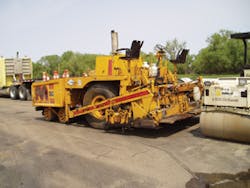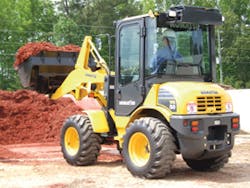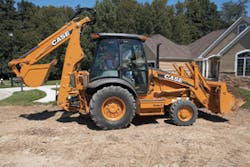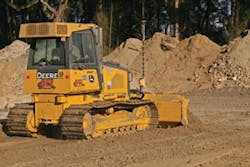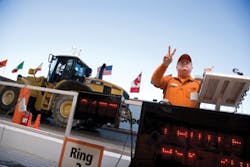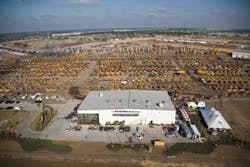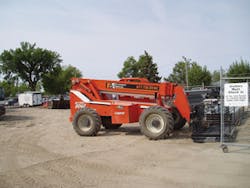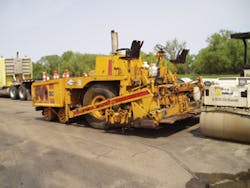There is no group more renowned for paying cash for their purchases than contractors. It is a reputation of which they can be proud, a tradition that marks the independence and strength of their work. Sometimes, however, cash has better uses than new equipment, and financing becomes the advised approach. The more people you talk to, the more opinions you get. That is true of political solutions, religious convictions, sporting selections, and equipment acquisition. Contractors have always shown that great preference for owning equipment, and paying cash for it, but changed circumstances (and these may indicate opportunity, uncertainty, or necessity) dictate that some kind of financing may be the best way to acquire new equipment today. The three choices commonly suggested for equipment are buy, rent, and lease, with options within those options. In other words, you can acquire the equipment you need for your daily work or a special project one way or another. There’s no doubt about it. Good equipment is available, at competitive prices, and the financing options are available.
Is it simply a question of immediately available money? Again, it depends to whom you are talking. Your best advisor for the purely financial aspect of the buy-rent-lease equation is the accountant who knows your business best. That may be yourself, your company accountant, or a financial expert whom you consult on serious matters. I have read about, and spoken to, businesses that have never taken advantage of helpful tax breaks for acquiring their equipment simply because they don’t know about the breaks. With the stimulus package this year, there are even more opportunities, but you have to know about them. Let me repeat that your best advisor is probably the accountant who knows your business best and knows what advantages exist for different methods of equipment acquisition. If you don’t have such an accountant, you should surely find one. (He or she doesn’t have to know as much as you about earthmoving. In this instance, it is the purely financial knowledge and strategy that is more important.) Whatever intricate aspects there are to your situation, the sheer financial challenges must be met and solved. Leasing business equipment is not a solution if you cannot afford to buy anything or afford to make regular repayments, just as it is not a good solution in similar private, personal circumstances. Renting equipment is not an escape, it is a practical solution to an immediate problem. And, yes, there is more to it than just the money involved up front.
“Renting equipment provides a tremendous economic benefit to customers,” asserts Per Ohstrom, vice president of Marketing for RSC Equipment Rental, one of the world’s biggest and most experienced companies in the rental arena. “Renting equipment means that you spend money only when and where you need the equipment. Equipment that sits idle can be very, very expensive. Renting equipment also means that you get the best equipment for the job, because you can tailor everything to suit the project, specify exactly what you need, and when you need it. Not only do customers receive the assurance of a well-maintained machine, but they also avoid the hassle and expense of having to service the equipment themselves.”
Your Best Place to Finance
Seldom mentioned in national discussions, but of major importance to contractors in many communities, especially our thousands of smaller communities, is the fact that the exact equipment you need may not be available locally.
If a contractor has a regular need for a loader of this size, he will probably buy it and may use cash or manufacturer financing to do so.
Renting the right machine may mean locating it at a rental company a hundred or more miles away. That will increase the real cost of renting. It can, however, still be more practical than purchasing the equipment for a one-time use. If the project you have won involves equipment you do not have in your yard, your bid price will surely have included such eventualities.
“Because industrial equipment is such a significant investment, many companies are forced to hold on to an asset that becomes devalued quickly, and they must continue to pay for the storage and maintenance of a piece of equipment that is used infrequently,” adds Ohstrom. “In contrast, rental fleets have an average life span of just five years, making them younger, less prone to problems, and more environmentally sound as they let out fewer emissions than older diesel engines.” In some states, like California, that may be most important. The quality and reliability of the equipment you intend to use on your project can have a beneficial effect on your bid. Using equipment of acceptable quality in all respects can help you to qualify as a bidder.
Everything changes in our industry, doesn’t it? Scraping becomes more efficient. Dozing is faster and today’s machines can offer more accuracy with that speed. Excavators dig exactly as you wish, and loaders do their lifting, loading, dumping and hauling with an efficiency (in both productivity and fuel consumption) that would have seemed impossible a decade ago. The changes are in everything, in big, obvious results, but also in smaller details.
For example, what exactly can a rental company provide? Just a machine? Just a piece of equipment you need today? Only small machines? One of the considerations that rental companies would like contractors to use in their calculations about the best way to keep their crews supplied and busy on the job is the knowledge of how much the rental company can provide. Is their price more than it would cost to do everything yourself? The greatest challenge for the equipment owner may be keeping that equipment in good condition. Do you do that better than a rental company with its team of technicians? Is the extra in a rental cost worth the difference? Keeping good maintenance technicians is one cost of ownership that contractors may ignore or neglect.
Machines that are constantly busy are often owned by the contractor.
With products in our personal and business life we have favorites. We are basically loyal consumers. Thanks to good experiences, we prefer to own a particular brand of excavator or dozer. With not-so-good experience, we shy away from some brands, too. It’s the same with our personal vehicles and other products like stereos, televisions, and clothes. Or perhaps we prefer to shop at one store or supermarket rather than another, and it’s not always a matter of price or the brand names of the foods. One of the objections to renting from companies with national or international manufacturer names has been that “the customer is too limited in the matter of equipment choice.” That may be a misconception.
Volvo Rents Construction Equipment offers Volvo machines. Obviously! As you know, and Volvo knows, that manufacturer does not make every machine or tool you could need onsite. “Why should I rent from a Volvo store, then?” asks the contractor who doesn’t know how much is offered. He could ask the same question about a Cat Rental store. Or others that have a manufacturer’s name up front. At the Volvo rental store you can acquire equipment from Volvo, such as excavators and loaders, but also equipment from well-known manufacturers like Ditch Witch, Genie, John Deere, JLG, Vermeer, Wacker, MultiQuip, JCB, Bobcat, Bomag, Husqvarna, Lincoln Electric, and Trimble. The selection is wider than you may have expected. You can also get emergency services. According to the company’s rental promise, you can expect to receive: service, first and foremost; trust in the equipment and the service; quality equipment from excellent manufacturers; and a partnership and friendliness that help to get the job done well. It’s more than simply equipment for rent, and the rental store will deliver the equipment to your site.
The heart of many earthmoving contractors’ fleets, a reliable dozer is often owned by its user.
Lest you think I am favoring one company here, have a look at the equipment you can find at a Cat rental store. You’d expect graders, loaders of all types, and excavators. But say you needed some small compaction equipment for part of the project or a machine that you know Caterpillar doesn’t make. It may be at the Cat rental store. You could also find shoring and shielding equipment, pumps, forklifts, dumpers and buggies, brooms and sweepers, air equipment, aerial work platforms, and concrete equipment. The best rental stores try to offer a contractor everything that is needed at the job site, so that the store becomes a single source for equipment and tools required even if the manufacturer’s name is not the same on every piece of equipment.
Here’s an added challenge familiar to many contractors. In my small community there is no rental store for construction equipment. That may be true for hundreds or thousands of communities and it may explain why contractors based in small communities are less likely to rent and more likely to purchase their machines. Every business deal that brings convenience to your operations also brings added expense. You need to work out (or have that good accountant work out) what are the advantages and disadvantages of renting equipment from a hundred miles away over purchasing the same equipment from your local dealer. Service is the top priority, according to most contractors we know. You must know that the renting company will be available at your site if you need them for repair, maintenance, or any emergency that crops up. Obviously, the nearer the provider, the quicker the response, but you should investigate the efficiency of bigger rental companies located miles away. Will they come to your remote site to help you? How fast can they react?
Flexibility From Financing
“Rental companies have taken the industry beyond just machinery, adding benefits that exceed the cost,” observes Per Ohstrom. “For example, Mobile Tool Rooms from RSC are portable trailers custom stocked with the specialized tools and small equipment used for a short-term project. Total Control, an RSC proprietary software program, allows the customer to manage its fleet more efficiently, plus it can manage costs, time, and rental spending, all issues of particular importance on long-term projects with large job sites. Rental companies provide preventive maintenance updates to ensure the reliability of its equipment. At RSC, preventive maintenance is so important that we are 98% current on manufacturers’ suggested preventive maintenance. Our disciplined maintenance programs result in higher customer utilization of equipment. That means greater overall productivity.”
Auctions can be good sources for the equipment you need, whether you bid in person or online.
Answers to the question as to whether renting, leasing, or purchase is the best method for progress and growth in today’s volatile economy depend heavily on our ability to negotiate a purchase, rental, or lease that is flexible enough to allow you to keep your equipment and crews busy. One phrase I have seen to describe what contractors need in these times is “operational flexibility.” That means we must be prepared to undertake projects that have not been our usual business.
It means that earthmoving plusother construction work is what we may offer, as the demand for one segment of construction rises and another falls. Taking on different work will probably necessitate different, or more, equipment. Investigate (with your expert accountants) what is available now for leasing and purchasing strategies that are flexible enough to allow you to continue growing and profiting from contracts you can win. Most owners offering contracts today, whether they are private or public, will not award a contract to a company that cannot show it has or can obtain the necessary equipment (plus expertise and crews) to complete the projected work on time and on budget. Our local supermarket has just had its large parking-lot repaved…… by a company that is titled…“Excavation Company.” The company has expanded successfully in recent years by undertaking earthmoving and then paving so that it can offer customers a complete job. This excavating company owns its own paving equipment now, because it wins earthmoving-plus-paving contracts frequently.
The inventory of one leading auctioneer includes hundreds of excavators and mini-excavators, walkbehind compactors, hydraulic hammers, light towers, and dump trucks, to name only a few.
Who profits when you acquire equipment? Proponents of renting or purchasing will have many arguments to tell you why their method is best, because it is what they sell, what makes their own business succeed, so it is common sense to evaluate all the options with as clear a mind as possible. A friend of mine, president of one branch of a bank that has about 30, assures me that banks do not like the low, low rates that manufacturers are offering. “A bank cannot afford deals with zero-percent financing,” he quips. “Lending money is our business, but we must profit by doing so. In the last year or so we have seen manufacturers, not only in the auto industry but in all kinds of equipment, too, who have offered financing that is not in our best interests to challenge.” If you grew up with the assumption that purchasing with a financial program meant you would be arranging everything through a bank you knew well, you will be surprised by some arrangements that are being made today.
One needs only to look at newspaper reports or the network news to know that many of our financial woes in the last couple of years have seen questionable financial deals at their heart. We’ve heard of houses sold to people who couldn’t afford to repay the loans, vehicles too big, too expensive to fit into somebody’s budget, but also equipment sold to contractors who had not bothered to research the pros and cons of different deals or evaluated the future use of equipment they wanted for a current project. Some of the deals that went sour were blamed on banks that gave loans to companies or individuals who did not merit them, but there is always another side to every story. Contractors who may be unable to repay the loan for purchase of a much-wanted machine (for one job?) are as guilty of impractical business practice as the banks or other sources who lend them the money. You can understand why contractors have built up such a good history of cash transactions, can’t you? They have been criticized as over-cautious, but their survival proves their good sense. One of the interesting statistics is that financing (which is always more costly than a cash transaction) is more common for contractors who have multi-million-dollar businesses rather than for the thousands who do not.
This telehandler was rented for a brief portion of a major project.
A key question asked by contractors for many years and by generations of owners is: Can we justify purchase of this equipment now? It must be used constantly to justify its cost. While the proposed equipment may be busy for the next three months on that earthmoving project we won, what will it do after that? If you have hired mechanics and technicians to maintain your equipment, will they have enough work to justify their payroll if the equipment is not being used on a daily basis? Any doubt about your company’s ability to use new equipment constantly is often a good basis for renting. If you like, you can say that renting takes away some of the uncertainty of the future because, if your business slows down, you can always return rented equipment. If you own it all, it’s there, doing nothing but costing money in so many ways.
At this time, leasing is probably still more expensive than purchase, but some of the timing advantages it offers benefit those who can organize their work schedules to accommodate them. If you can find a leasing agreement that gives your business flexible terms and the chance to trade the current lease at a future date for new equipment, the additional, overall cost of leasing may be less than you imagine. Such an arrangement could be a good way to upgrade your dozers, loaders, and excavators without too much pain in your cash flow.
Which Should We Finance?
An aspect of equipment that can be forgotten or neglected is its newness. How long does a good excavator work for you? How many jobs can you get from a competent dozer? Some reports say that most construction equipment lasts for about 30 years. How efficient is it at the end? Is it, in fact, obsolete and non-competitive? In all the arguments back and forth about buying outright, leasing, or renting, add another element. Is there a good used machine you could use? Not all companies that have had to sell off some of their equipment in the last year were uncaring, careless owners. Not all the equipment they removed from their yards was useless. “Circumstances” can put an excellent house on the market, an excellent car or pickup truck, an excellent earthmoving machine.
This paver is busy year-round and is owned by an excavation contractor.
Auctions can be good sources for the equipment you need. For some auctions you can either go to the auction in person or bid for what you want on the Internet. What’s available? I looked at the likely inventory of one leading auctioneer (Ritchie Bros.) and found several hundred excavators, several more hundred mini-excavators, hundreds of walk-behind compactors, hundreds of hydraulic hammers, light towers, dump trucks, crawler tractors, loader backhoes, skid-steer loaders, wheel loaders, water trucks, scrapers (motor and pull-along), graders, and thousands of equipment attachments.
So, yes, there is equipment available, and, yes, there is a way for you to acquire it. Is there a best financing method? The more you research this issue, the more you feel that the question is like asking if there’s a best color, a best song, a best vehicle, or a best anything. The best financing (which may be no financing from outside sources!) is the option that is best for you and your company today. All the favorite options of renting, bank financing, and leasing have their fans but you will probably find that the best method is quite personal and particular. It is the financing that suits your exact needs at an exact time. For this month’s biggest project, it may be renting. For next year’s daily work, it may be bank financing. The best method for you exists, it’s simply a question of finding it, and that almost certainly involves asking somebody who knows all the options and all the advantages of this one and that one.